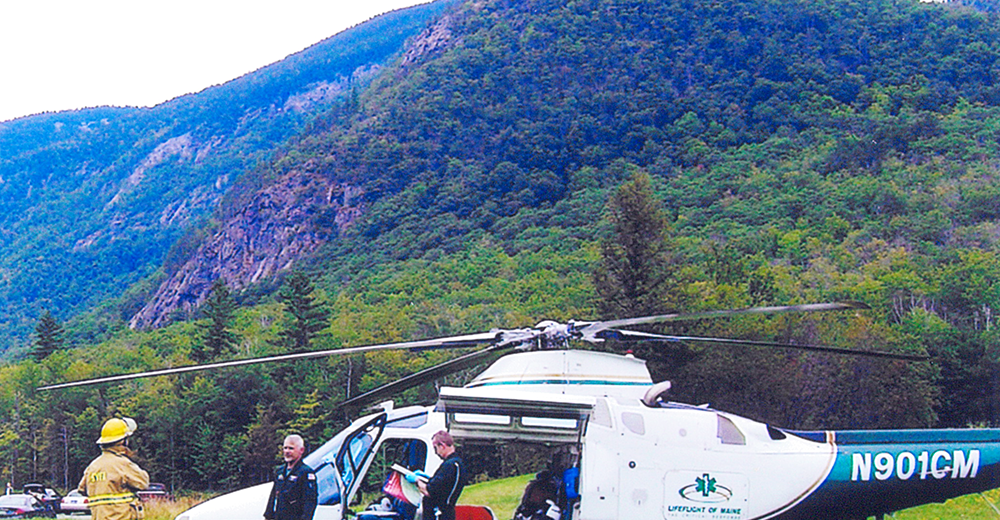A Second Chance on Life: Stories from LifeFlight Patients
Over the past 25 years, LifeFlight has cared for more than 37,000 patients. Working together with our EMS and hospital emergency and intensive care providers, we work to change time and geography, to reset the clock for a patient suddenly in need with their life at stake. Here are three vignettes out of thousands of LifeFlight stories through the years.

by Jesse Ellison
This article appeared in the October 2023 issue of Dispatches.
It’s been sixteen years since Lauren Lamberson was in the accident that almost killed her.
She was five years old, strapped into the back seat of a Cessna float plane on a glorious August morning in Western Maine. Her mother, Beth Andrews, sat next to her, with Lauren’s three-year-old brother Kyle on her lap. Their dad, Kevin, sat shotgun; a family friend flew the plane.
They were landing on Kezar Lake, but as they hit the surface, the plane, which mistakenly had its wheels down, bounced and then flipped, somersaulting over. In seconds, they were under water and sinking fast, the bright morning light suddenly growing darker and darker and murkier and murkier as they plunged to the bottom of the pond.
Kevin couldn’t find the handle to his door but managed to kick out the windshield and escape to the surface. To this day, Beth says she isn’t sure how she did it — images of the plane that she saw later showed her door pinned closed by a piece of wreckage — but she managed to escape with Kyle in her arms. Lauren was still strapped into the back. So was the pilot — he didn’t survive.
People had seen the accident from the shore and rushed out to help. One diver donned goggles and swam down to where Lauren was but was unable to undo her seat belt. In a moment that seems like it must have been fueled by some feat of maternal super strength, Beth took the diver’s goggles, swam down to the plane, got Lauren out of her seatbelt, and brought her to the surface of the pond. She’d been underwater for at least five minutes. She wasn’t breathing, she had no pulse, and she was turning blue.
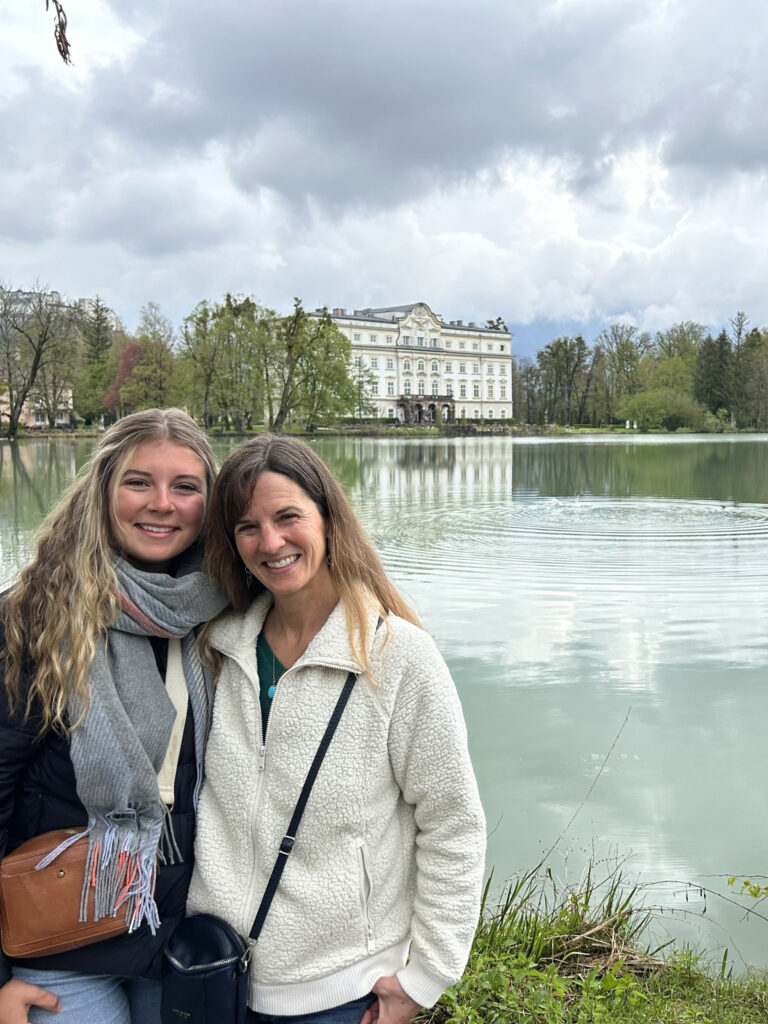
“As fate would have it,” Beth recounted recently, “there was a doctor who runs an ER in Boulder, Colorado, asleep in the camp closest to where it happened.” He was woken up and brought out to where Lauren’s little body was lying on the bow of a boat. “He will tell you that he almost didn’t do it because she’d been in the water for so long,” Beth remembers. But he did, and he succeeded in breathing breath back into her lungs, reviving her. Within minutes, LifeFlight arrived, intubated Lauren, breathing for her in the short flight to Maine Med, where she immediately was admitted to the pediatric ICU and was sedated and placed on a ventilator. Within hours she awoke neurologically intact and went home the very next day.
Beth says that at one point a medical professional told her that since Lauren was so young, she’d still had a womb-like ability to breathe a little bit under water, but she’s not sure whether the theory is backed by science. What she is sure of is what a lot of survivors will say that they know: that that day, the difference between life and death was in a series of tiny lucky breaks. If any one thing had gone differently — if Beth hadn’t been such a strong swimmer, if there hadn’t been a doctor in a house that was so nearby, if that doctor had hesitated even a minute longer to perform CPR, if Lauren hadn’t gotten to a hospital with the speed that she did, if the weather had turned and prevented LifeFlight from flying — in any of these scenarios, the outcome could have been horrific. That day, August 4, 2007, changed everything for that family. To think how easily it might have been so much worse, well, it makes one shudder.
“I would not be here talking to you if it was not for every link in the chain coming together,” says Jake Stoddard.
On October 21, 2001, he was thirteen years old and helping his father clear land on a property the family had recently bought just outside of Greenville, in Lily Bay Township. They were up in a tree with a chainsaw when “the chainsaw decided it wanted to jump out of the tree,” he recalls ruefully. “My left thigh was in its path.” The chainsaw, which was running, sliced through his femoral artery, which runs the whole length of the body. “Yep,” Jake says, “I hit the big one.”
This was 22 years ago, before cell phones were ubiquitous. The family had one, but in the chaos immediately following the accident, it had been flung out of reach. Jake’s first stroke of luck was that an RV happened to drive by. His mom flagged it down. They had towels and a phone and called 911 while his mom pressed the towels to his leg, trying — and largely failing — to stop the blood loss.
“From the cop, to the paramedic, to the helicopters being able to fly that day, and with their resources and the fact that they had blood on board. That’s what saved my life.”
– Jake Stoddard
Jake says one of his most vivid memories from the incident was looking up at the first responding police officer, who’d (luckily) been just up the road when the call came in, and asking groggily if he would be able to go to school the next day. “No,” the officer told him. Jake’s last memory of the day is being loaded into a LifeFlight helicopter. At the time, the organization was just three years old. He was taken to Bangor, where a vascular surgeon was waiting for him, and his parents did the two-hour trip in their car, arriving when Jake was already in surgery. When they walked into the hospital, his father was “literally covered in blood, head to toe.” Jake spent two full weeks in the hospital, and he still has no feeling in his left foot. But, he’s alive.
“There were so many parts to the process that had to come together to make it all work,” Jake, who’s now married, living in Hallowell, and working for the Maine State Police, says. “From the cop, to the paramedic, to the helicopters being able to fly that day, and with their resources and the fact that they had blood on board. That’s what saved my life. If any link in that chain was broken, it would have been a different outcome. Every piece of the puzzle that came together is the reason why I’m here today.”
This is what Melanie Lajoie thinks about, too, when she reflects on the car accident she was in thirteen years ago.
“Truly, in my situation it was minutes,” she says. “Minutes matter.” Melanie, a speech pathologist, was on her way to work, talking on the phone with her father, when an oncoming car veered over the center line and crashed into her minivan. The van was destroyed, and the impact had broken both of Melanie’s femurs, a tibia, ribs, pelvis, tailbone and shoulder blade. She had massive internal injuries, and was hemorrhaging.
The previous weekend, Melanie, her husband Greg, and their two little boys, then one and three, had visited her father in Schoodic, and while they were there, her dad had realized that he didn’t have Greg’s phone number and had saved it in his phone. On the other end of the line that morning, he heard the entire accident, and he immediately called Greg. Knowing that his wife was traveling from Windsor to Palermo, Greg got in his car and drove the route in a panic. He arrived just as Melanie was being cut out of her vehicle with the jaws of life. Paramedics, rescue personnel, and police officers were everywhere. LifeFlight was there, too. When they got her out of the van, they put her in a helicopter for the fifteen-minute trip to Central Maine Medical Center in Lewiston. She was losing so much blood so quickly that she needed two full units just to make the trip.
“Greg kept saying, ‘you have to fight for us,’” she says. “All those little things: my dad putting the number in, Greg making it to the crash site, LifeFlight getting there…. It was like the stars were aligned.”
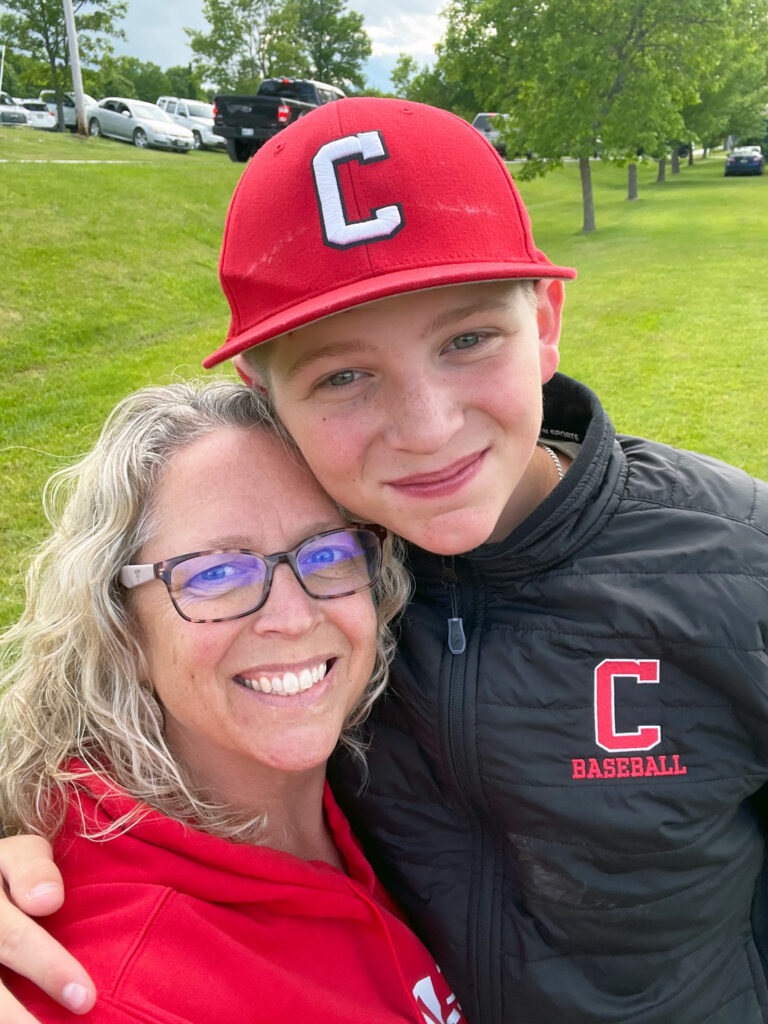
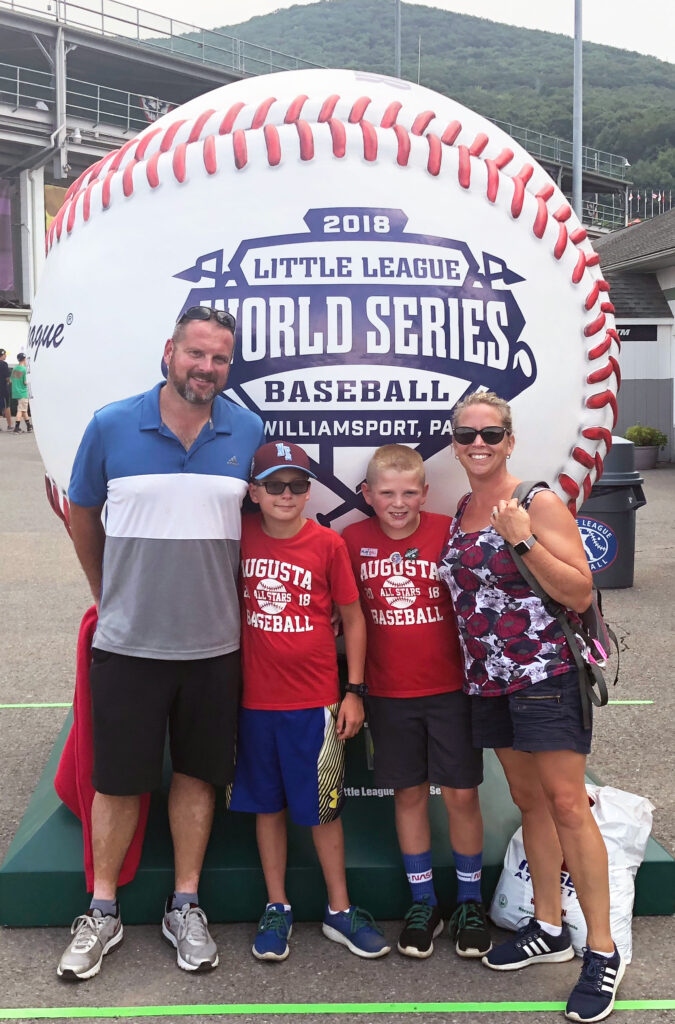
It’s a remarkable thing to say about an accident that put her in a coma for eleven days and led to 25 hours of surgeries and weeks of rehab. But that is the gift of deep gratitude. This year, her youngest son will be a freshman in high school, which she mentioned as she choked back tears. “It’s been thirteen years, but millions of memories,” she says, her voice breaking. “That there are these people who choose this profession, this line of work, and are able to think that quickly and respond to traumatic events and be really level- headed, it just amazes me. They’re going to work for the day, but they’re changing your life, the whole outcome of your life. They’re giving you a second shot, changing your story. Without them, my story is very different.”
Melanie says that in the years after her accident, when she would hear a helicopter, her heart would sink, thinking about the fact that someone else might be where she was that day, or even worse. “I had to transform it from a sinking feeling to a thankful feeling,” she says. “Somebody today might be alive. I close my eyes and think, I’m so thankful.”
Lauren, meanwhile, is now 21 years old and a senior at Clemson University in South Carolina. She doesn’t remember the plane crash itself, but her family does, and all of them say they’re changed by it. For her sixth birthday, instead of gifts, it was her idea to ask instead for donations to LifeFlight, a tradition she continued all the way through high school, raising thousands of dollars along the way. By middle school, motivated by the accident, she says, she’d become a swimmer, and she swam competitively until going off to college. When we spoke at the end of August, just after the anniversary of her accident, she had recently returned from a semester studying abroad in Southern Spain, during which she also traveled to Greece, Austria, and by boat to Morocco.
“Lauren and her brother have definitely turned the accident into strength,” her mother, Beth, says now. Kyle, she says, “uses the story to remind himself that he’s resilient and he’s a survivor. Just to remind himself that life can get pretty rough, but there’s a way to get through it.”
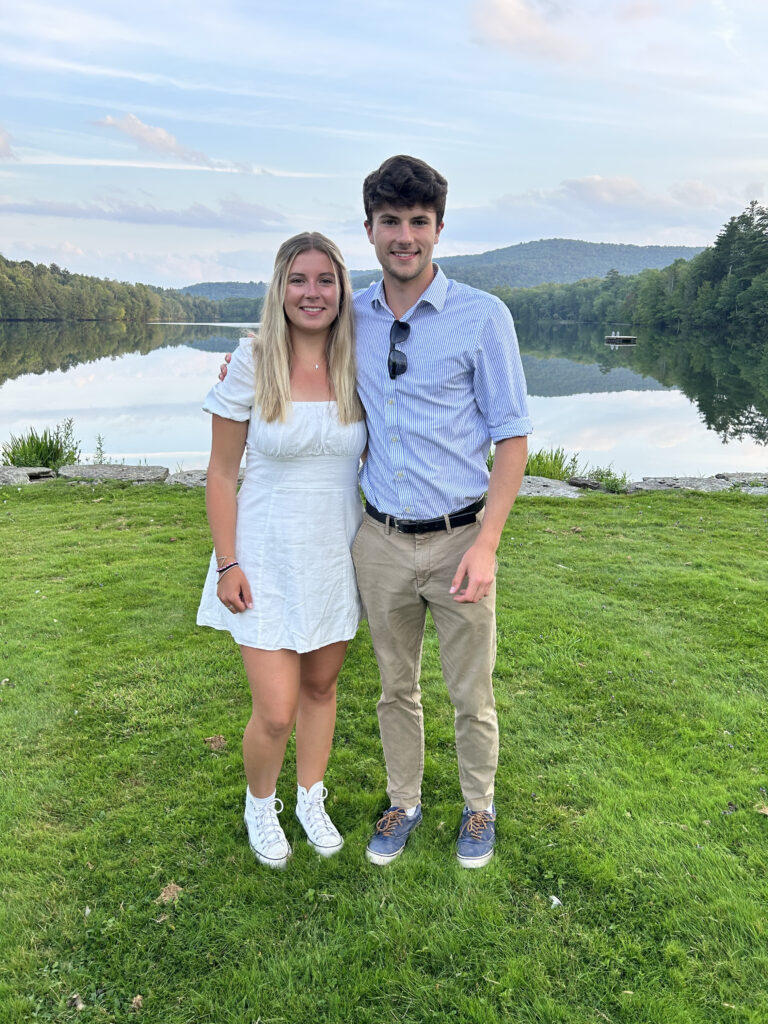
Lauren has spent the last several summers working at a summer camp for underprivileged boys in upstate New York. This year, because it was her last year as a counselor, she followed the tradition of giving a speech during an outdoor chapel one night. She chose to talk about the accident. “The big lesson I want you all to take away from this is to live each day to the fullest,” she told the kids, as they sat silent and agape hearing for the first time what had happened to her. “You never know when it could end. I promise you I remember this each day, especially while we are here at camp, because our days here don’t last forever. …. Take these last few days to make memories with your friends. I hope if you take one thing away from my speech, you remember my message to live each day to the fullest.”
Jesse Ellison is a freelance journalist and contributing editor at Down East Magazine based in midcoast Maine.
